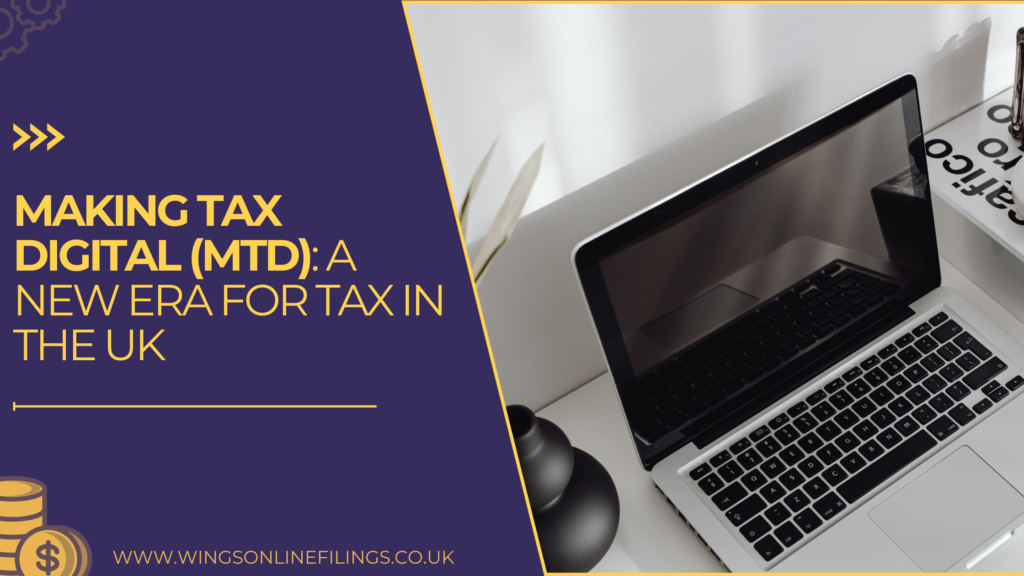
Introduction
Making Tax Digital (MTD) signifies more than a policy shift; it’s a fundamental change in how UK businesses manage taxes. Explore our guide to understand how this digital transformation simplifies tax administration, making it effective, efficient, and easier for taxpayers.
What is Making Tax Digital?
Making Tax Digital (MTD) is a government initiative in the United Kingdom that aims to transform the tax system by making it more effective, efficient, and easier for taxpayers to manage their tax affairs. The key feature of Making Tax Digital is the requirement for businesses and individuals to maintain digital records and submit their tax returns online using compatible accounting software. It is a main part of the government’s Tax Administration Strategy.
Key benefits of Making Tax Digital
Embracing a digital transformation of the tax system, Making Tax Digital aligns with HMRC’s vision for modernizing tax processes. The initiative promises a distinctive array of benefits:
1. Seamless Tax Compliance: Simplifying the process for individuals and businesses to accurately fulfill their tax obligations.
2. Integrated Tax Management: Enabling customers to seamlessly intertwine tax management with diverse business operations through advanced software solutions.
3. Enhanced Productivity: Fostering wider productivity gains by fostering a culture of digitalization within businesses.
To curb avoidable errors and mitigate tax losses, Making Tax Digital relies on:
1. Precision in Digital Records: Elevating accuracy levels through the adoption of digital record-keeping.
2. Built-in Assistance: Many software products are designed with additional support features, offering assistance to users navigating tax-related complexities.
3. Direct Submission to HMRC: Facilitating efficiency by directly transmitting digital records to HMRC, minimizing the risk of errors and ensuring a streamlined submission process.
Key Components of Making Tax Digital
At the core of MTD are three key components: digital record-keeping, digital links, and submitting VAT returns using MTD-compatible software. These components work in tandem to create a seamless and more transparent tax reporting system.
MTD for Businesses
Small businesses, in particular, stand to gain significantly from the implementation of MTD. The impact on tax processes is profound, streamlining operations and reducing the likelihood of errors that could lead to financial repercussions.
MTD for Individuals
Individuals are not left out of this digital revolution. The way personal income is reported has changed, with user-friendly tools making it easier for taxpayers to manage their obligations.
Impact of Making Tax Digital
Digital Record Keeping: Under MTD, businesses are required to maintain their financial records digitally using MTD-compatible accounting software. This includes details of income, expenses, and other relevant financial transactions.
Quarterly Reporting: Instead of submitting an annual tax return, businesses and individuals are generally required to provide updates on their financial activities on a quarterly basis. This involves submitting summary information to HM Revenue and Customs (HMRC) through their digital tax accounts.
Online Submission: MTD mandates the submission of tax returns and updates online. Paper-based submissions are generally no longer accepted for those within the scope of Making Tax Digital.
VAT Reporting: Making Tax Digital for VAT was the first phase of the initiative, requiring VAT-registered businesses with a taxable turnover above the VAT threshold to keep digital records and submit VAT returns using MTD-compatible software.
Phased Implementation: The implementation of Making Tax Digital is being rolled out in stages, with different deadlines for different groups of taxpayers. It started with businesses above the VAT threshold and is expected to expand to other taxes in the future.
Challenges and Concerns
The implementation of Making Tax Digital (MTD) has encountered challenges, a typical aspect of substantial changes. Certain businesses experienced initial difficulties adjusting to the novel requirements. Valuable feedback from the business community has played a pivotal role in refining the MTD framework, underscoring the importance of an iterative and responsive approach to ensure the seamless integration of digital tax processes in the UK.
Choosing MTD-Compatible Software
Selecting the right MTD-compatible software is a pivotal decision for businesses. With various options available, understanding the features and compatibility of different software solutions is essential. Factors such as scalability, ease of use, and integration capabilities should be considered when making this choice.
Preparing for Making Tax Digital
Embarking on the Making Tax Digital journey demands a strategic blend of education and proactive measures for UK business owners. To navigate this fiscal evolution seamlessly, businesses must invest time in acquainting themselves with the stipulated requirements while seeking invaluable guidance from HMRC. Fortunately, a wealth of resources and supportive measures are readily available, serving as indispensable tools to facilitate a smoother transition towards MTD compliance. By embracing these initiatives, businesses can not only meet the regulatory demands but also streamline their financial processes for enhanced efficiency in the dynamic landscape of UK taxation.
Educating Businesses on MTD
Making Tax Digital’s triumph depends on broad awareness and comprehension. Crucially, businesses must be educated on MTD’s advantages, prerequisites, and compliance steps. Empowering businesses through training programs and informative resources is pivotal for a seamless adaptation to these changes in the UK tax landscape.
Impact on Accountants and Tax Advisors
In the era of Making Tax Digital, the functions of accountants and tax advisors undergo a transformative shift. Instead of concentrating solely on manual data entry, these professionals are assuming the role of strategic advisors. Their expertise is instrumental in navigating businesses through the intricate nuances of the digital tax landscape, ensuring a more strategic and informed approach to compliance and financial management in the UK.
Future Developments in Making Tax Digital
In the dynamic realm of digital taxation, HMRC constantly introduces new features and requirements, shaping the landscape for businesses. Anticipating and comprehending future developments in Making Tax Digital is imperative for staying ahead of the curve. By proactively adapting to these changes, businesses can ensure a strategic and resilient approach, navigating the evolving tax landscape in the UK with foresight and agility.
Common Misconceptions about Making Tax Digital
Dispelling misconceptions is pivotal in easing the transition to Making Tax Digital (MTD). Addressing fears, from concerns about data security to myths about increased complexity, is crucial. By clarifying the facts surrounding MTD, businesses can make informed decisions, fostering a smooth adaptation to the evolving tax landscape in the UK.

Conclusion
In conclusion, Making Tax Digital is not just a compliance requirement; it’s a transformation that benefits businesses in the long run. Embracing digital methods for tax management brings efficiency, accuracy, and transparency to financial processes. As we navigate the digital tax revolution, businesses are encouraged to see MTD as an opportunity to modernize and thrive in the evolving business landscape.

